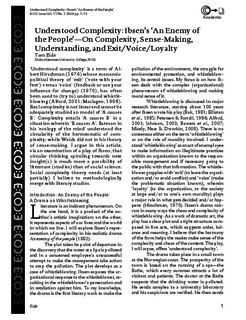| dc.contributor.author | Eide, Tom | |
| dc.date.accessioned | 2011-01-20T08:33:54Z | |
| dc.date.available | 2011-01-20T08:33:54Z | |
| dc.date.issued | 2009 | |
| dc.identifier.issn | 1532-7000 | |
| dc.identifier.uri | http://hdl.handle.net/11250/98891 | |
| dc.description.abstract | ‘Understood complexity’ is a term of Albert Hirschman (1976) whose economicpolitical theory of ‘exit’ (‘vote with your feet’) versus ‘voice’ (feedback or use your influence for change) (1970), has often been used to (try to) understand whistleblowing (Alford, 2001; Maclagen, 1998). Real complexity is not linear and cannot be adequately studied an model of ‘A causes B’. Complexity entails ‘A causes B’ in a situation wherein ‘B causes A’. Bateson in his ‘ecology of the mind’ understood the circularity of the hermeneutic of complexity; while Weick did not in his theory of sense-making. I argue in this article, via an examination of a play of Ibsen, that circular thinking spiraling towards new insight(s) is much more a possibility of literature (studies) than of social science. Social complexity theory needs (at least partially) I believe to methodologically merge with literary studies. | en_US |
| dc.language.iso | eng | en_US |
| dc.publisher | ISCE Publishing | en_US |
| dc.relation.ispartofseries | E:CO Emergence: Complexity & Organization;3 | |
| dc.subject | litteraturkritikk | en_US |
| dc.subject | litteraturvitenskap | en_US |
| dc.subject | Henrik Ibsen | en_US |
| dc.title | Understood Complexity: Ibsen’s ‘An Enemy of the People’—On Complexity, Sense-Making, Understanding, and Exit/Voice/Loyalty | en_US |
| dc.type | Journal article | en_US |
| dc.type | Peer reviewed | en_US |
| dc.source.pagenumber | s. 1-15 | en_US |
